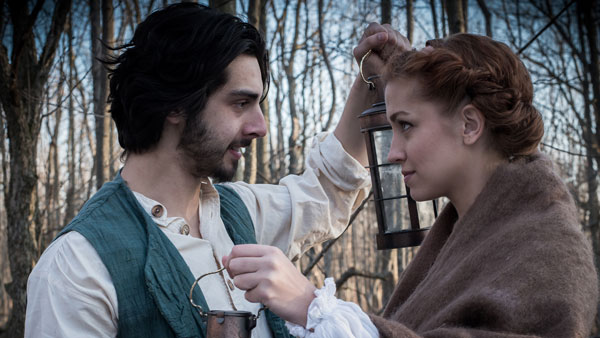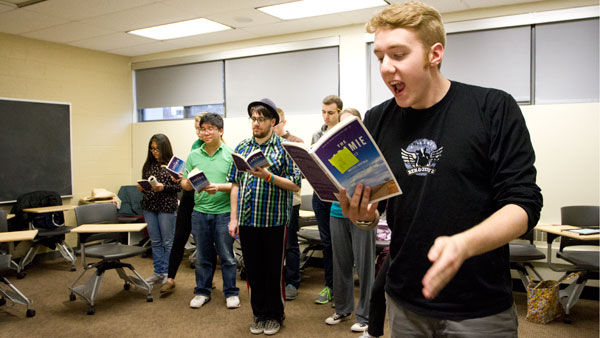A large cross hangs over Ithaca College’s Main Stage’s Hoerner Theatre as drama and deception unfold for a Puritanically strict town in Salem, Mass. The hysteria of the Salem Witch Trials takes over the stage by the manipulation of the set, creating drama and paranoia for the townsmen.
“The Crucible” was written by Arthur Miller during the Red Scare in the 1950s as an allegory for McCarthyism, a campaign from 1950 to 1954 led by Senator Joseph McCarthy against accused communists in the United States government and national organizations. The accused were ostracized or lost their jobs, even though many were not communists. Writing this play was Miller’s attempt to link the McCarthyism accusations to the tragedy that happened from February 1692 to May 1693 during the Salem Witch Trials.
Set in the 1690s, the story begins with a small group of teenage girls conjuring up love potions for their crushes with a maid named Tituba. A few days after they make the potions, some of the girls fall ill. Because of this, the town begins to suspect witchcraft was involved. Accusations of witchcraft fly, and the accused are tried, prosecuted and executed.
Director Norm Johnson, associate professor of theater arts, said there were witch scares documented throughout history, but none were as dramatic as the Salem incident.
“It spun out of control,” Johnson said. “All one had to do, initially, was point to somebody else who was accused of some kind of witchcraft and they were called out from there.”
Senior Alex Tortora, who plays the main character John Proctor, said the play is about the consequences of different dramatic elements colliding together to create a dramatic story.
“[The play] shows a lot about when society, love, revenge, religion, politics, all this stuff starts coming together and the result of explosiveness that comes out of it,” Tortora said.
Senior Rachel Rosen, who plays Elizabeth Proctor, John Proctor’s pregnant wife who is accused of witchcraft, said honesty is the primary theme of the play, as it is questioned through every scene in the characters’ blatant accusations of one another.
“When your society is questioning your honesty and you know that you’re honest, you have to question, ‘Do I want my name and do I want to know for God that I was honest, or do I need this material existence to know that I am good even if I’m lying for that?’” Rosen said.
Senior Taylor Misiak plays Abigail Williams, the antagonist of the play who accuses many townspeople of witchcraft, and said the choir makes the college’s performance original because it brings out the eerie mood of the play. The choir is live and, at different times of the show, will surround the audience or the stage.
“Typically there isn’t music in ‘The Crucible,’ but we’ve artistically and intelligently inserted music into the show,” Misiak said. “You’ll hear a Puritan hymn when religion is really present, and it [will] go dissonant when evil is present.”
The stage is raked, meaning it is angled toward the audience, putting the actors and the audience members on a more even level. There is also a thrust platform where all of the interior scenes and the majority of the action takes place. The student-made set, headed by senior Andrew Hostler, is also surrounded by woods and hanging crucifixes. Though the trees are realistic to the setting of Salem, the multiple crucifixes symbolize the importance of religion within the town. As drama increases, the stage changes to show that the town is falling apart, Misiak said.
“As the world is ripped apart by the Salem Witch Trials, trees are ripped out of the ground,” Misiak said. “The audience will see Salem falling apart, and the more and more trees that are ripped apart, the more we see the crosses in the background.”
Rosen said she’s delighted the production is telling the story that Arthur Miller wanted to tell in a very powerful way without overdoing the aesthetics. The cast wears clothes telling of the period, particularly the hot bulky dresses and button-up shirts.
“We’re telling it in costumes of the period and on the set of the period,” Rosen said. “The set is just abstract enough to be thought provoking; it’s not boring, and yet it’s also not confusing.”
Misiak said she hopes the audience enjoys the show and takes away a lesson about the trouble and consequences that can result from paranoia and prejudices.
“I want the audience to be wildly entertained by the drama of the show and understand the gravity of a situation where fear, discrimination and intolerance can result in a series of events that only make things worse, like [in the show], the deaths of innocent people,” Misiak said.
Ithaca College’s Main Stage Theater’s production of “The Crucible” runs April 22–27 at Hoerner Theatre. Tickets cost $8 for students.









